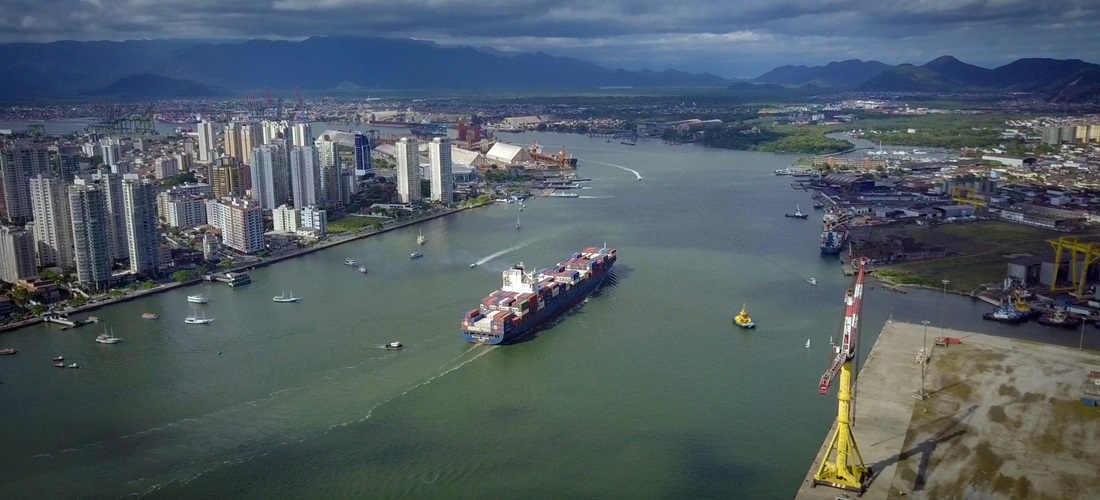
Santos Port Enforces New Regulations on Ballast Water to Protect Marine Ecosystems
Aug, 16, 2024 Posted by Gabriel MalheirosWeek 202433
From August 21 onward, all ships heading to the Port of Santos will be required to present a certificate of compliance with international ballast water disposal regulations. Ships that do not display this document will be kept from docking. The Santos Port Authority (APS) has issued a regulation in response to the global threat of bioinvasion by foreign species, which endangers marine life and causes significant environmental and social damage, as in the subsistence of subsistence fishing farmers in Brazil and the globe.
The Port Authority of Santos has already informed the Maritime Shipping Agencies Union (Sindamar) about this new regulation, prompting many shipowners to submit their certificates. The APS has put in place a remote monitoring system that utilizes Artificial Intelligence, GPS, and other tools to verify whether ships have discharged ballast water in designated areas or have adopted filtration systems, procedures mandated by the International Maritime Organization (IMO) and in line with Brazil’s Normam 401/DPC.
“This triangulation of widely available real-time data, which leave what we call electronic traces, will allow us to know beforehand whether the two types of internationally approved solutions have been fulfilled even before a ship reaches the port,” said APS president Anderson Pomini.
Ballast water is essential for navigation safety, especially when ships are lightly loaded or empty. Ships use heavy water tanks located in their hold to keep their propellers submerged. Thus, water collected in ports and estuaries around the world ensures the vessel’s stability, preventing damage and avoiding capsizing during storms. The amount of ballast water collected depends on the cargo size—less cargo means more ballast water. After enough cargo is loaded onto the vessel, the ballast water may be disposed of.
By bringing wastewater, toxic materials, and even species from one region of the planet to another in this ballast, ships can create severe environmental and public health issues. Many of these animal and plant species are endemic, lack natural predators, and can reproduce rapidly, competing with native species. Pathogenic bacteria and other harmful organisms can also be transported from one area to another along with the ballast water discharged into the sea.
The issue of bioinvasion is growing as shipping moves about 10 billion tons of ballast water annually. In Brazil, this amounts to 80 million tons per year, with 95% of foreign trade occurring via maritime routes.
As the largest port in Latin America, the Port of Santos is highly responsible for upholding sustainable practices. The chart below uses DataLiner data to compare long-haul container imports and exports at the Port of Santos between January 2021 and June 2024.
Santos Container Movement | Jan 2021 – Jun 2024 | TEU
Source: DataLiner (click here to request a demo)
Under the regulations, ships have two options: D1, which entails discharge in oceanic waters, or D2, which requires treatment of ballast water onboard before discharge.
“We are taking an important step in defending the environment and global public health by doing so,” Pomini noted, recalling his long-standing advocacy for this commitment, which was adopted by the company’s environmental framework in 2014.
The company authorized by the APS, Balance Water Central (BWC)—which will ensure compliance with the regulations based on information provided by the ship, such as geographic coordinates, among other data—has had its system previously tested by the APS, according to the company’s director, Paulo Andrade.
Before the use of this innovative technology, ship inspections were conducted through sampling based on information provided by ship captains. Now, all ships will be tracked to ensure more efficient control, said the APS Operations Directorate, which is supported by professionals from the Environmental, Health, and Labor Safety Superintendency (Sumas) in this effort.
-
Other Logistics
Feb, 22, 2023
0
Waterway use grows 5.36% in Brazil
-
Shipping
Sep, 11, 2024
0
Board allocates over R$ 11 Billion to finance naval sector projects
-
Ports and Terminals
Aug, 25, 2023
0
Selection process for Port of Itajaí new operators gains official start date
-
Shipping
Apr, 14, 2020
0
Maersk announces reduction in vessel calls on Far East and ECSA services due to lower demand

